Updated on the 17th of November 2025.
💡Executive Summary
Since April 2024, Germany’s medical cannabis market has seen impressive growth. Patient numbers have soared from roughly 250,000 to nearly 900,000 in just over a year, driving imports to triple and annual sales toward €1 billion. This growth is powered by telemedicine, especially in rural regions (60% of rural patients rely solely on digital prescriptions), and a rapidly expanding product catalog of 600+ cannabis flower driving average costs down. But Germany is only scratching the surface… the legal cannabis industry only services around 13% of the total market of cannabis users in the country.
To the dismay of many, a proposed August 2025 draft law threatens to roll back remote prescribing and mail‐order dispensing, mandating in-person consultations that could cut off tens of thousands of patients and destabilise pharmacies.
Executives must act now: engage in the regulatory consultation, invest in compliant telehealth platforms, optimise pricing amid an oversupplied, highly competitive market, and educate prescribers to help them navigate the complexities of cannabis and its various product ranges. Otherwise, restrictive policy will drive patients back to the illicit market and stall Germany’s progressing medical cannabis industry.
Table of Contents
- Germany’s Medical Cannabis Market Is Booming—But Uncertainty Looms
- Import Surge and Patient Demand: The Numbers Behind the Growth
- Why Patients Are Ditching the Illicit Market
- What’s at Stake: The Impact of the Proposed BMG Legislation
- Court Rulings Add Legal Pressure
- The Unintended Consequences of Restriction
- July 2025: The BPC pushes back against the BMG bill
- October 2025: German cabinet approves the BMG’s proposed amendments to MedCanG
- November 2025: German Health Committee issue their recommendations on MedCanG
- Conclusion: A Crucial Moment for the Future of German Medical Cannabis
Germany’s Medical Cannabis Market Is Booming—But Uncertainty Looms
Since the partial legalisation of cannabis in April 2024, Germany’s medical cannabis market has grown at an unprecedented pace. According to the Federal Institute for Drugs and Medical Devices, more than 100 tonnes of cannabis flower were consumed by patients in just 12 months. And in the 13 months since CanG was implemented, the number of medical cannabis patients has exploded from roughly 250,000 to 900,000, according to William Mueke from Artemis Growth Partners at a recent International Cannabis Business Conference (ICBC).
Albert Christian Schwarzmeier, CEO of enua Pharma Gmbh, gave a more conservative estimate of current patient numbers to be around 800,000, further breaking those patient numbers down into:
- 230,000 medically reimbursed patients
- 500,000-600,000 self-paying patients sourcing cannabis from pharmacies
- 100,000 members in cultivation associations
Despite the recent boom, Albert still says Germany’s medical cannabis market is yet in its infancy – only servicing around 13% of the total market (as approximately 6.2 million adults in Germany consume cannabis at least once per year). This implies cannabis sourced from the illicit market still dominates.
So what's driving the legal cannabis boom?
The market expansion we are seeing is driven largely by telemedicine and soaring demand from Germany’s rural regions (such as in various areas of Bavaria). According to German health portal, GreenMedical, in rural areas where medical infrastructure is already stretched thin, 60% of patients say online care is their only viable option. Additionally, in North Rhine-Westphalia (NRW) alone, more than 17,000 patients have accessed cannabis therapy digitally.

Even in politically conservative Bavaria where cannabis opposition is strong, telemedicine adoption is high, ranking the state #1 for digital cannabis treatment, followed by NRW in second place.
However, further progress appears uncertain as looming regulatory changes threaten to reverse some of these gains, leaving patients and stakeholders in a state of uncertainty.
Import Surge and Patient Demand: The Numbers Behind the Growth
According to a recent report by Bloomwell, Germany’s biggest digital platform for medical cannabis, the past year has seen:
- Imports tripling from April 2024 to April 2025.
- Over 600 distinct cannabis flower now available on the licensed market.
- An increasing demand for non-irradiated flower and low-cost options, with 35% of flower sold in May priced at €6 or below.
- An exceeding number of prescriptions filled in May & June 2025 compared to March 2024 by approximately 1,100%.
Furthermore, prices are dropping rapidly as import volume has exceeded demand, particularly for mid-tier flower (20-25% THC) – where majority of current inventory sits. Overall, the average cost per gram fell to €7.49, down from over €8 earlier in the year. Furthermore, considering how pharmaceutical cannabis has a limited shelf life, the oversupply only risks bulk product stored in warehouses losing more value or even spoiling.
On the flipside, the current oversupply & subsequently intensifying price war, while tough for producers, benefits patients and makes a significant dent in the illicit market.
Why Patients Are Ditching the Illicit Market
A Bloomwell survey of over 2,500 patients offers compelling evidence of medical cannabis’s public health impact:
- 57% of patients previously used the illicit market, while 22% sourced through acquaintances.
- 47.5% now consider pharmacy-grade cannabis more affordable than illicit market alternatives.
- 82% of respondents feel safer using pharmacy-supplied cannabis, citing lower contamination risks.
- Most critically, 40% say they would return to illicit sources if digital access is restricted – even though 74% believe illicit cannabis poses serious health risks.
What’s at Stake: The Impact of the Proposed BMG Legislation
Germany’s Federal Ministry of Health, the Bundesministerium für Gesundheit (BMG) is currently evaluating a draft law that could reshape the landscape of medical cannabis access. Stakeholders have until August 2025 to submit comments, with final decisions expected shortly after.
It is evident, with this deadline just right around the corner, that the BMG intend to move swiftly.

Key provisions under review include:
1. Mandatory In-Person Consultations
A proposed rule would require at least one face-to-face doctor-patient interaction per year for patients receiving cannabis flower prescriptions. In an already overloaded healthcare system, this could drastically reduce access – especially in underserved rural areas.
2. Ban on Remote Prescriptions & Mail Order
The “Fernverschreibungs‑ und Versandhandelsverbot” would prohibit remote prescriptions and online dispensing of cannabis flower. Patients may be forced to visit multiple local pharmacies in search of their specific medication – at potentially higher prices.
3. Tightening Oversight of Telehealth Platforms
The BMG is reacting to a surge in private telehealth platforms issuing cannabis prescriptions without prior in-person exams. While not all telemedicine is under fire, prescriptions based solely on online questionnaires are now facing legal scrutiny.
Court Rulings Add Legal Pressure
In a significant development, the Munich I Regional Court recently ruled that issuing cannabis prescriptions purely online violates professional medical standards – though the court’s full reasoning has yet to be disclosed.
Meanwhile, professional bodies such as the Apothekerkammer Nordrhein are already taking legal action against pharmacies that collaborate with platforms failing to meet traditional care standards.
The Unintended Consequences of Restriction
Should the proposed restrictions be enacted, many cannabis industry professionals share the same sentiments regarding what could be at risk:
- Loss of patient access – especially for those in rural areas.
- A return to the illicit market, where products are unregulated and potentially harmful.
- Reduced tax revenue for the government.
- Economic instability for pharmacies, telehealth platforms, and cannabis suppliers.
- Job losses across the medical cannabis supply chain.
Perhaps most paradoxically, the strongest critics of telemedicine access are based in regions with the highest adoption rates. These political decisions may ultimately alienate their own constituents.
July 2025: The BPC pushes back against the BMG bill
On 31st July 2025, the Federal Association of Pharmaceutical Cannabinoid Companies (BPC) released a statement to push back against the BMG’s draft law.
The BPC ‘represents the interests of pharmaceutical companies and wholesalers of cannabis medicines at both the federal and state levels to politicians, authorities and institutions in the healthcare sector’.
Within the statement, the BPC argues the proposed amendments would:
- effectively act as a ‘blanket ban’ that would ‘directly and existentially affect reputable, quality-assured providers’.
- stigmatise patients who currently rely on cannabis-based treatment.
- lead patients to switch back to sourcing from the illicit market – jeopardizing the progress achieved so far by the MedCanG.
- accentuate the discrimination of cannabis-based treatment compared to the prescription drugs such as opioids or benzodiazepines – which are more likely to induce abuse and dependence.
As such, their statement offers a counter-proposal in which the BPC:
- Agrees to the proposed mandatory initial meeting with a medical contact as part of the medical cannabis prescription procedure. However, it should also be made available digitally.
- Demands planned ban on mail order sales to be deleted as the doctor-patient contact already ensures adequate medical control and advice.
- Demands the planned extension of criminal and administrative offense under MedCanG should be deleted as the existing law already contains comprehensive criminal law regulations and further restrictions will only weaken the industry due to legal uncertainty.
Petition to 'Stop planned changes to the medical cannabis law from February 17, 2025'
On the 17th of July 2025, a petition was created titled, ‘Geplante Änderungen des medizinischen Cannabis-Gesetzes stoppen vom 17.07.2025’ (in English: ‘Stop planned changes to the medical cannabis law from February 17, 2025’).
The petition pushes back against the BMG’s proposals to tighten the medical cannabis law.
It argues that:
Many patients in rural areas do not have doctors nearby who prescribe cannabis. They would have to travel long distances or wait – often several weeks or months.
Many pharmacies do not stock medical cannabis. Without mail order, this would result in long journeys or no supply at all.
Doctor’s appointments cost money – up to £100 per visit. People with chronic illnesses often cannot afford this.
As a result, many lose access to their urgently needed medicine.
The petition closes on the 5th of November, after which people supporting the motion can no longer sign. As of October 29, the petition has already been signed by over 50,600 people.
October 2025: German cabinet approves the BMG's proposed amendments to MedCanG
On October 2, 2025, the BMG sent a TRIS notification to the European Commission stating their intentions to amend MedCanG.
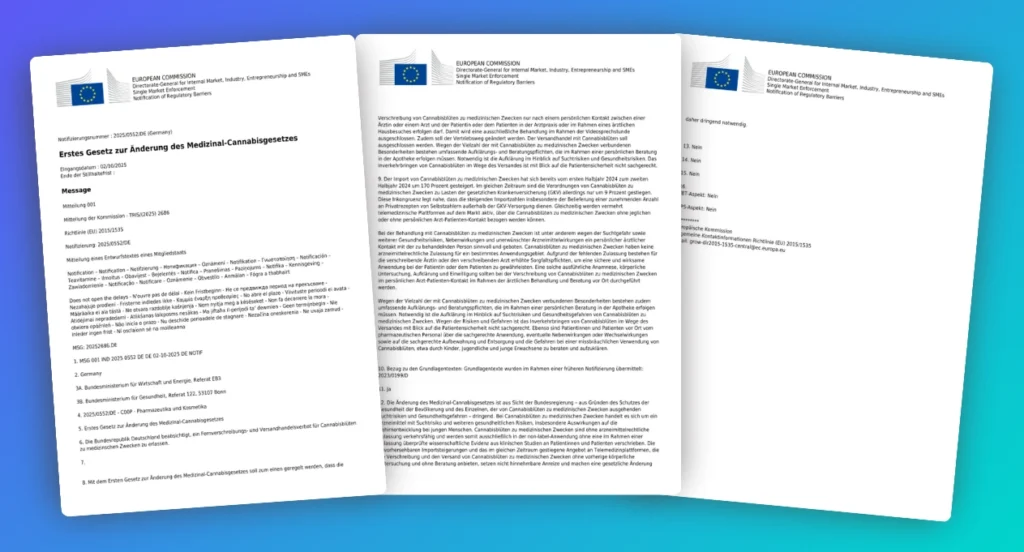
A few days later, on October 8, 2025, the German Cabinet approved the BMG’s proposals to restrict MedCanG – effectively tightening access to medical cannabis.
The updated law:
- Mandatory in-person meetings for initial prescription – Prescriptions for medical cannabis will first require an in-person consultation with a doctor (either in the doctor’s office or during a home visit). The aim is to ensure a proper medical evaluation rather than purely online or questionnaire-based prescribing
- Repeat prescriptions – After the initial in-person visit, follow-up prescriptions are only permissible via telemedicine if the in-person visit took place within the previous four quarters. Otherwise, a new in-person visit would be required.
- Ban on mail order delivery – The draft prohibits dispensing medicinal cannabis by mail order. Distribution must be via physical pharmacies. However, pharmacy delivery services (so-called “Botendienst”) are not affected.
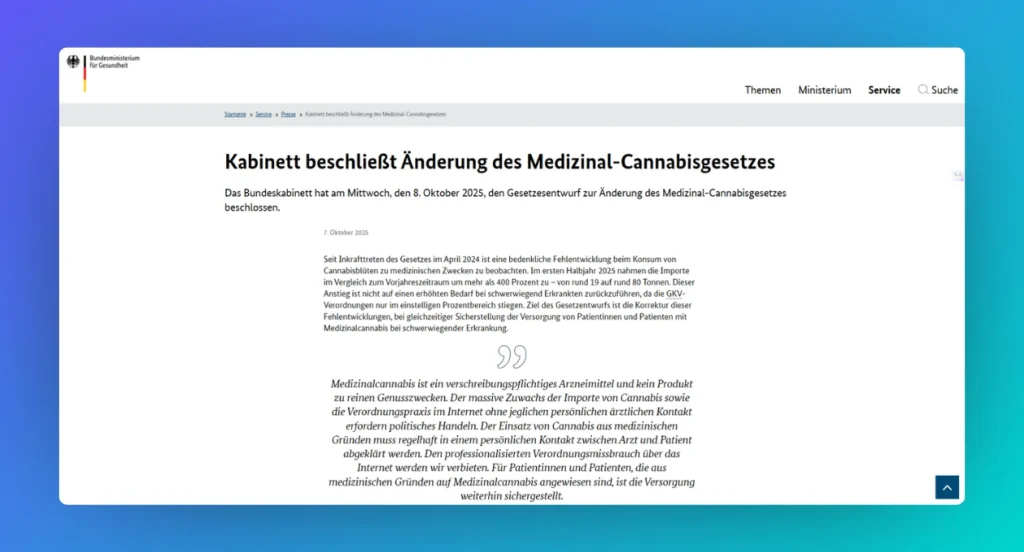
Overall, the speed at which the amendments passed serves as a definitive indication of the government’s commitment to advancing these reforms, paving the way for the bill to be discussed in both the Bundestag (Federal Parliament) and the Bundesrat (Federal States Chamber).
We are yet unsure when the final decision will be made, but historically it takes an average of over 7 months for amendments to clear both the Bundestag and Bundesrat.
As such, a realistic estimate is that the amendment could be finalised and enter into force around the first half of 2026, likely Q2 2026.
November 2025: German Health Committee issue their recommendations on MedCanG
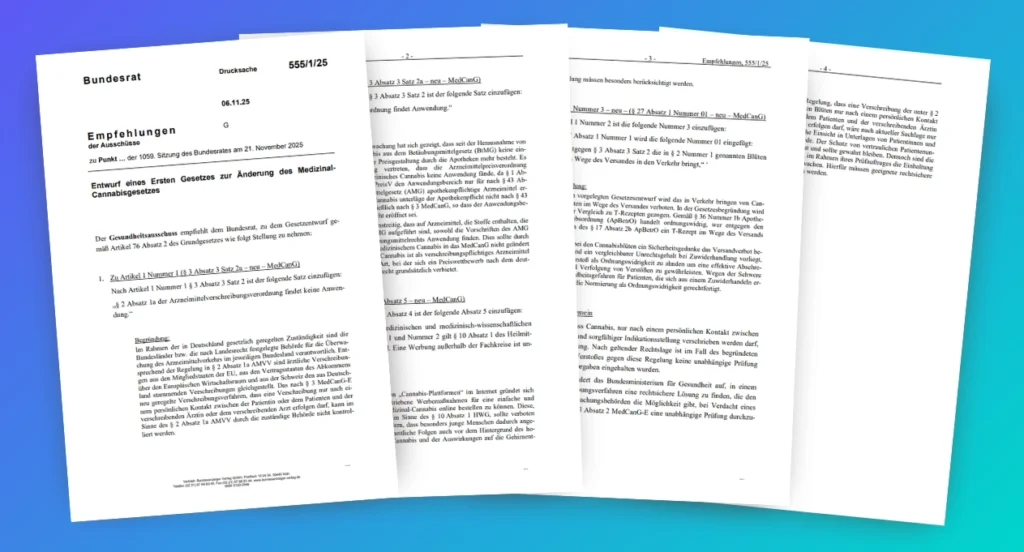
On the 6th of November 2025, the Health Committee of the German Bundesrat released its recommendations on the Medical Cannabis Act (MedCanG), ahead of a plenary vote scheduled for 21 November 2025.
Key takeaways:
• Prescriptions from abroad: Medical cannabis prescriptions issued in other EU or EEA member states would no longer be accepted under the proposed framework. Authorities argue they have no reliable way to confirm whether the legally required in-person consultation took place for prescriptions issued outside Germany.
• Pricing rules: The committee suggests bringing medical cannabis under the remit of the German Drug Price Ordinance (AMPreisV). This move is designed to rein in the uneven pricing practices seen in pharmacies since medical cannabis was removed from the Narcotics Act (BtMG).
• Advertising limits: Advertising medical cannabis to the general public (Laienwerbung) should be banned. The recommendation specifically targets “cannabis platforms” that rely on broad, consumer-facing promotion to drive rapid online orders.
• Ban on shipping flowers: Breaching the forthcoming prohibition on mailing cannabis flowers should be treated as an administrative offence (Ordnungswidrigkeit), with the aim of strengthening deterrence and enforcement.
• Compliance monitoring: The Federal Ministry of Health (BMG) is being urged to put in place a legally robust system that allows oversight bodies to confirm adherence to the in-person consultation requirement without compromising patient confidentiality.
It remains unclear whether these recommendations will pass in the Bundesrat or survive the remainder of the legislative process.
Conclusion: A Crucial Moment for the Future of German Medical Cannabis
Germany is at a crossroads. The data is clear: digital access has expanded safe treatment, reduced illicit market reliance, and provided affordable care to tens of thousands of patients. Any policy shift that restricts this access should be carefully weighed against the potential for real harm – not just to patients, but to the healthcare system, the economy, and public safety.
As the BMG moves toward regulatory decisions onward into 2025 – and perhaps early 2026, all eyes are on how Germany will balance access, oversight, and innovation in its rapidly evolving medical cannabis market.


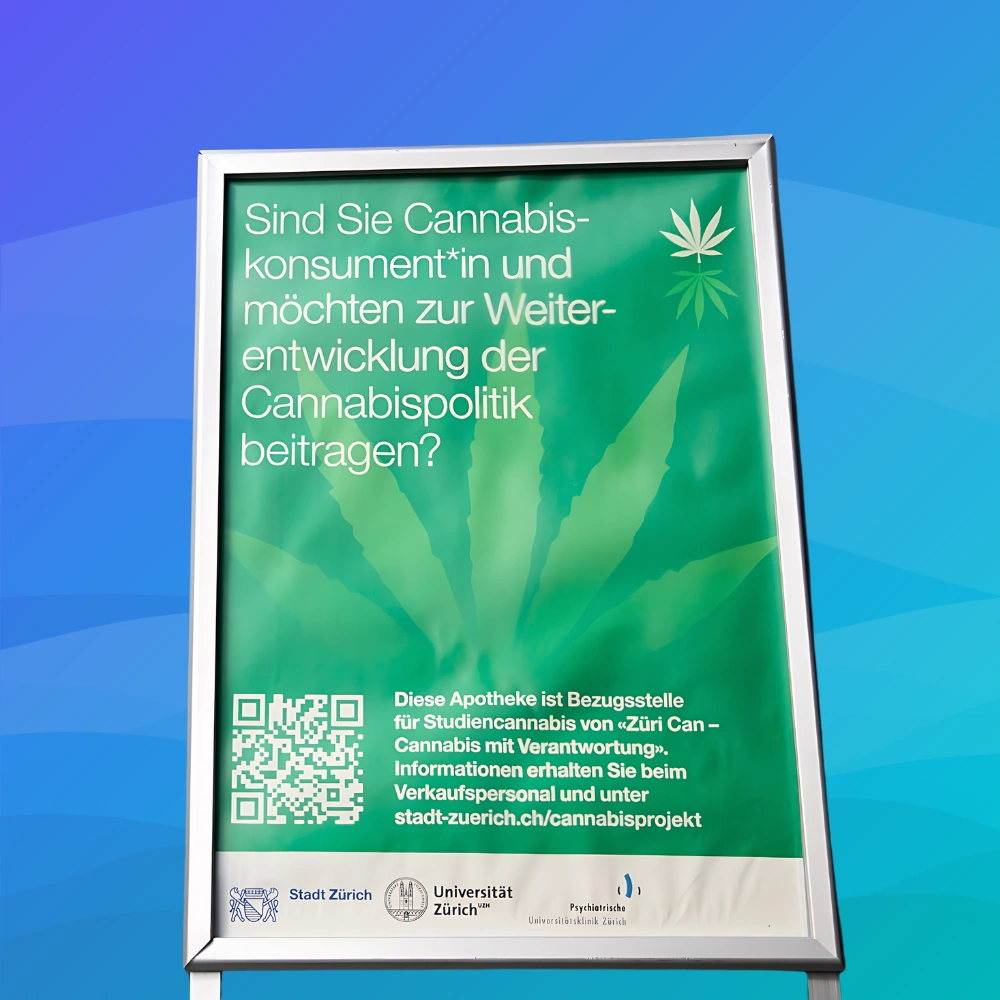
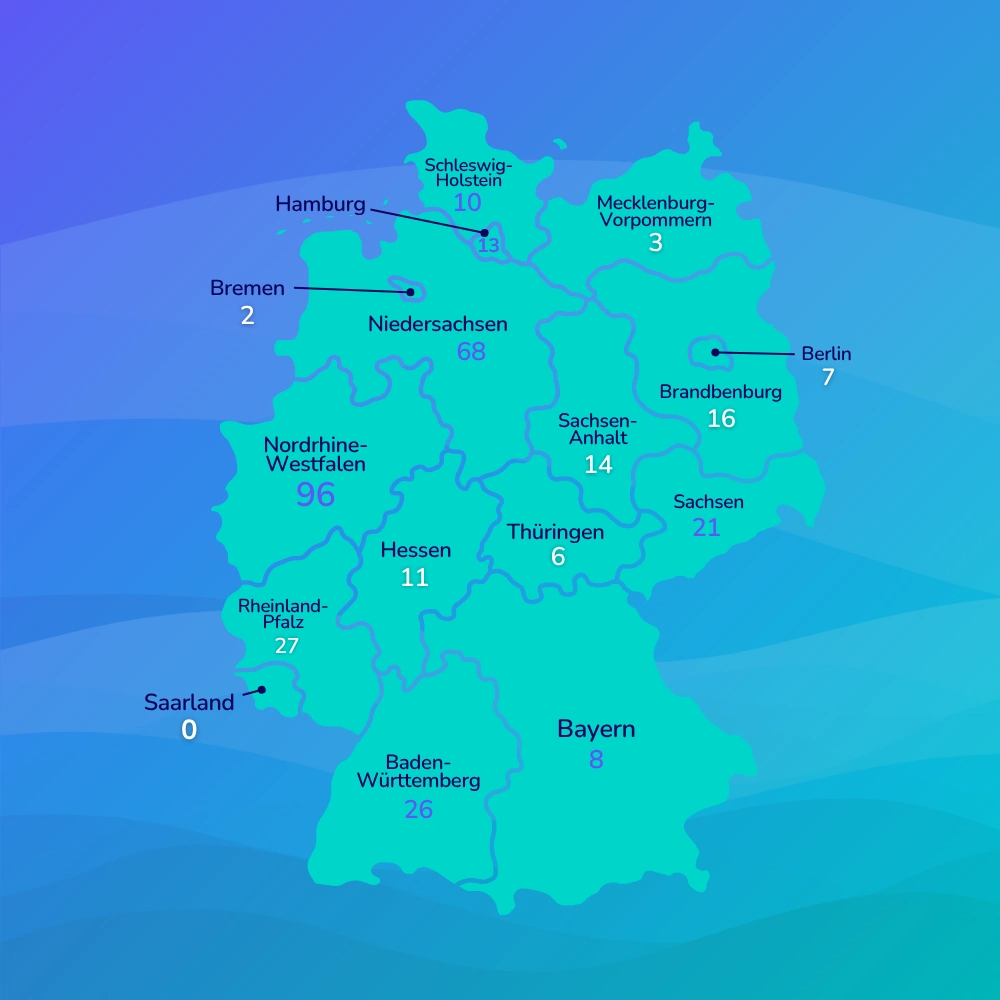

One Comment